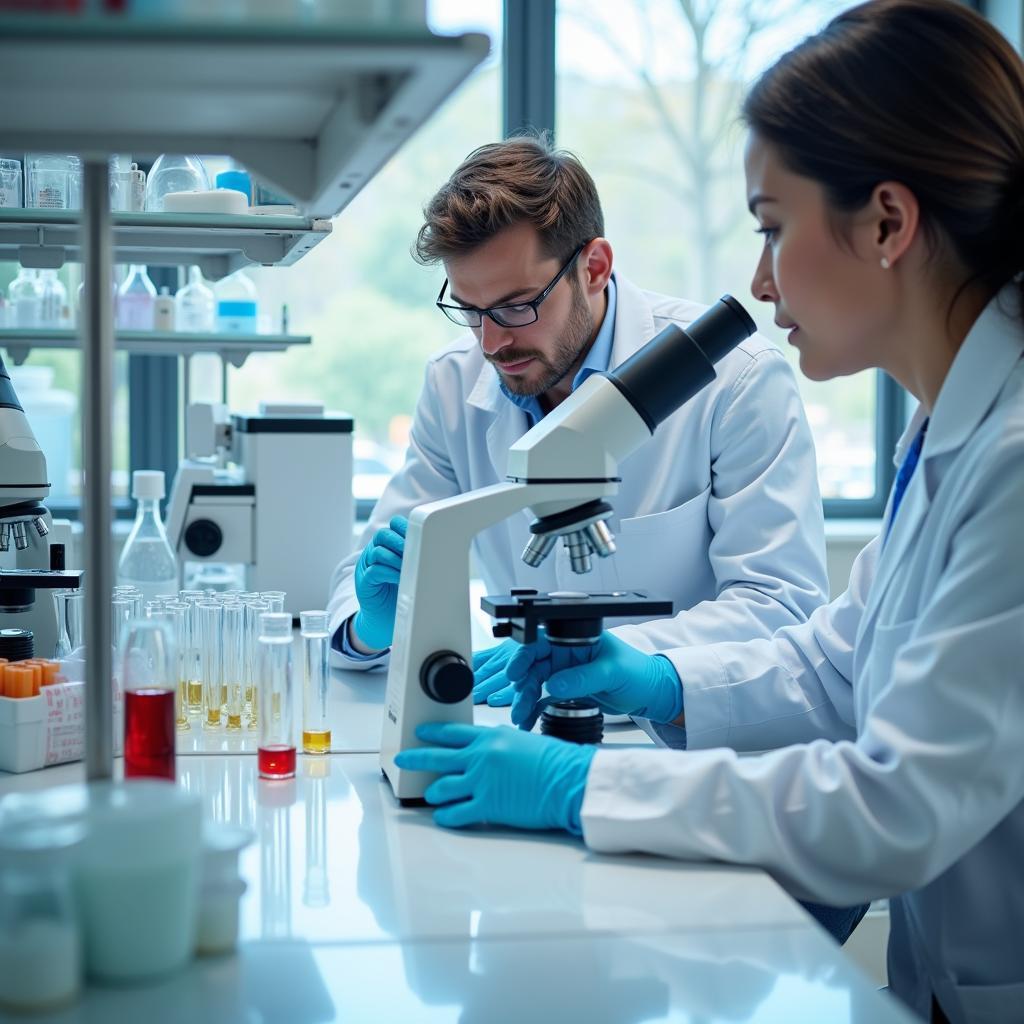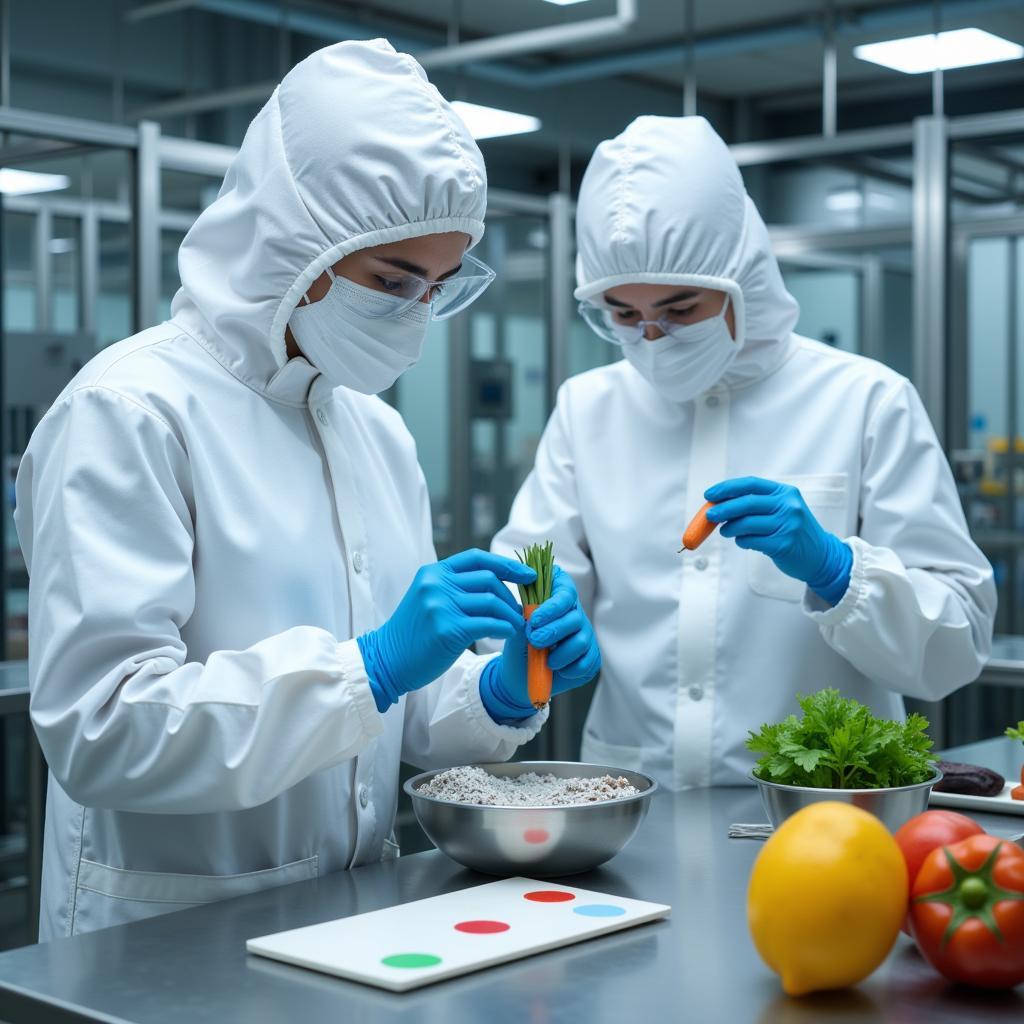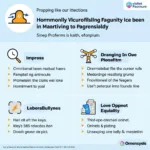The topic of genetically modified organisms (GMOs) and their regulation has appeared multiple times in IELTS Writing Task 2 exams, particularly in 2019-2023. Based on analysis of past papers, questions about GMO restrictions often focus on food safety, environmental impact, and economic implications. Let’s examine a recent real test question and provide model answers across different band scores.
Analysis of Task 2 Question
Some people think that governments should strictly control scientific research on genetically modified (GM) foods, while others think that this research should be encouraged. Discuss both views and give your own opinion.
This question requires candidates to:
- Discuss arguments for strict government control of GM food research
- Present viewpoints supporting freedom in GM research
- Express and justify a personal stance on the issue
 Scientists conducting GMO research in modern laboratory
Scientists conducting GMO research in modern laboratory
Band 8.5 Model Answer (295 words)
The debate over government oversight of genetically modified food research has become increasingly contentious in recent years. While some advocate for stringent controls, others believe scientific freedom should prevail. In my view, a balanced approach combining reasonable regulation with research freedom is most beneficial.
Those supporting strict government control argue that GM food research poses potential risks that must be carefully managed. They emphasize the unknown long-term effects on human health and ecological systems. For instance, modified genes might transfer to wild plants, potentially disrupting natural ecosystems. Additionally, there are concerns about allergic reactions and other unforeseen health consequences that could emerge years after consumption of GM foods.
Conversely, proponents of research freedom contend that excessive regulation hampers scientific progress and innovation. They point to the potential benefits of GM foods in addressing global food security and improving nutritional value. For example, golden rice, engineered to contain beta-carotene, could help combat vitamin A deficiency in developing countries. Furthermore, GM crops resistant to drought or pests could ensure more stable food production in challenging environments.
In my opinion, while oversight is necessary, it should not stifle innovation. I believe the optimal approach is to implement transparent regulatory frameworks that ensure safety while facilitating scientific advancement. This could include mandatory safety testing protocols and environmental impact assessments, combined with expedited approval processes for promising research directions. Such a system would protect public interests while allowing scientists to develop solutions for pressing global challenges.
Band 7.0 Model Answer (274 words)
The control of genetic modification research in food production is a topic that generates significant debate. While some people believe strict government regulation is essential, others argue for greater scientific freedom. This essay will examine both perspectives before presenting my own view.
Supporters of strict control worry about the safety implications of GM foods. They believe that without proper oversight, potentially dangerous products could reach consumers. For example, there are concerns about allergic reactions and other health problems that might only become apparent after long-term consumption. Additionally, there are worries about environmental damage, such as the impact on biodiversity when modified crops interact with natural species.
 Food safety scientists testing GMO products
Food safety scientists testing GMO products
On the other hand, those favoring research freedom argue that tight restrictions slow down important scientific progress. They point out that GM foods could help solve global hunger by creating crops that are more resistant to disease and climate change. These advocates also highlight how genetic modification can improve food’s nutritional value and reduce the need for harmful pesticides.
In my opinion, a middle-ground approach would be most effective. I believe governments should maintain safety standards through reasonable regulations while still allowing scientists enough freedom to innovate. This could include requiring safety tests before new GM foods are approved, but also providing support for promising research projects. Such an approach would help ensure both public safety and scientific advancement.
Key Vocabulary for GMO Essays
- genetic modification (n) /dʒəˈnetɪk ˌmɒdɪfɪˈkeɪʃən/ – the process of changing the genes of a living thing
- stringent (adj) /ˈstrɪndʒənt/ – strict, severe, or restrictive
- oversight (n) /ˈəʊvəsaɪt/ – supervision or watchful care
- biodiversity (n) /ˌbaɪəʊdaɪˈvɜːsəti/ – variety of plant and animal life
- regulatory framework (n) /ˈregjʊlətəri ˈfreɪmwɜːk/ – system of regulations and guidelines
- innovation (n) /ˌɪnəˈveɪʃən/ – introduction of new ideas or methods
- ecological (adj) /ˌiːkəˈlɒdʒɪkəl/ – relating to the environment and living things
- food security (n) /fuːd sɪˈkjʊərəti/ – availability and access to sufficient food
Conclusion
The GMO topic remains relevant in IELTS Writing Task 2. Future questions might explore:
- Economic impacts of GMO regulation
- International trade implications of GMO policies
- Role of GMOs in sustainable agriculture
Practice writing your own essay on this topic and share it in the comments for feedback. Focus on clear argument structure and appropriate vocabulary use to improve your writing skills.


